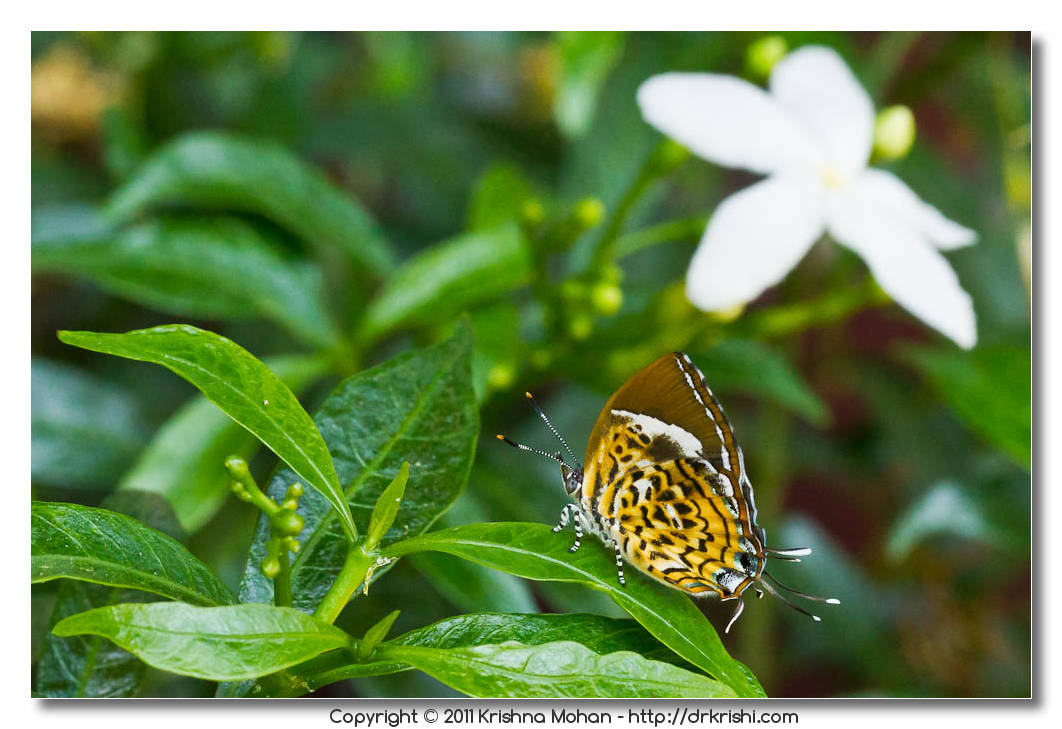
Monkey Puzzle I am referring to, is neither the political game which our politicians play, nor any other game I am trying to promote. That afternoon I was teaching my 10 year old daughter Neethi few basics of photography when she spotted a small butterfly with several tail filaments sitting on a crape jasmine bush. That butterfly is called Monkey Puzzle (Rathinda amor). My daughter wanted to try her hand on macro photography. I removed the flash and diffuser and just gave her my Canon EOS 1D Mark IV fitted with Canon EF 100mm f/2.8L Macro IS USM lens to try. Weight of this rig is too much to her tiny hands and she struggled to hold the weight. Nevertheless she managed to capture the butterfly quite successfully. Here is the photo she captured.

After she tried her hand, I wanted to take the similar shot. The butterfly was very cooperative. Here is my humble effort. As both of us were not using flash we had to push the ISO to 3200 to get aperture f/13 and speed of 1/200th second. Unfortunately the plant on which this butterfly was sitting was so awkward, that it allowed me only two good positions to take photos.

Later I connected my Canon Speedlite 580EX II with ExpoImaging Ray Flash Adapter. This gave me good light with which I could reduce the ISO to 100. The extra light from the flash allows you to extract a greater clarity from the picture by using lower ISO. The Monkey Puzzle, Rathinda amor is a small lycaenid or blue butterfly found in Western Ghats, South Indian plains, Orissa and Ganjam districts to Calcutta. Assam. Sri Lanka.

Its sexes alike. Wingspan – 26 to 28 mm. Upper side of this butterfly is dark brown. It has a white-spot end cell. It has narrow white spots on 2 and 3 which form a short band on the fore wing. On the UPH it has two black tornal spots and narrow dark reddish spot above them. The underside is white to dark yellowish brown. Fore wing has irregular dark basal markings with a curved white discal line. The apical two-fifths are a rich dark brown color. The hind wing has a silvery margin with many irregular black lines and spots within. It has three tails, being 2 mm, 6 mm and 2.5 mm in length.

This butterfly is found in jungle areas of moderate to heavy rainfall – both, in heavy forest and scrub. The butterfly occurs below 900 meters or so. It keeps to undergrowth and can be seen along forest paths and in clearings. The butterfly has a weak flight, it stays low and does not fly for long without alighting. Its method of alighting is interesting – as soon as it lands, it turns around and waggles its tail filaments, it also sidesteps for a while – all this is apparently to confuse a predator as to which side is the head. This is a likely reason that the first naturalists may have named the species the Monkey Puzzle. The butterfly has a number of food plants from families Rubiaceae, Dipterocarpeae, Euphorbiaceae, Loranthaceae, Sapindaceae and Myrtaceae. In my garden I found it was feeding on Ixora.


???????????,
???? ?????? ????????? ???????? ???? ?????? (lycaenidae). ??????? ?????? 40% ????????? ? ?????????? ???????. ?????????? ??????? ????????? ???? ????????? ?????????????? ? ????? ?????????. ????? ????? ???? ?????? ???? ???????????????, ? ??????? ???? ???? ??????????? ????? ??? ??????????? ???????????.
? ?????? ???? 3 ????? ??????????? ??????? ??????????????. ???? ????? ????????? ????? ? ???????? ?????? ????? ??????? ??????????????.
Its method of alighting is interesting
superb shots n details!
All the best Neethi, the talent is surely showing up…
Both the Sexes are alike? As per my understanding the male will be whitish and female will be brownish…
All your photos are of female
Thanks for your doubt Baburaj Sir. I rechecked references just to make sure, sexes are alike, but there is no difference between male and female. Whitish & brownish is equally distributed between males and females. Only method to identify female is to wait for her to lay eggs or examine genitalia. The mating picture showing different colors are not sexual dimorphism, but different color morphs. Females have also a peculiar habit of waiting next to the young larva (1st and second instar) and feeding on the leaf discharge from the wound created by feeding larva.